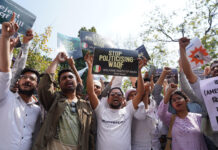Turkey has modified its educational curriculum this year by implementing a “new approach” to teaching evolutionary biology, as well as introducing the Islamic concept of Jihad.
These alterations come as an initiative from Turkey’s government, to implant a new “education of values.”
As a response to this shift in curriculum, some opponents to this gesture rejected new textbooks as “sexist” and “anti-scientific” because they perceived them to be dismissive of secular education.
Bulent Tezcan of the secular CHP party, said: “By embedding a jihadist education of values, they try to plague the brains of our little children, with the same understanding that transforms the Middle East into a bloodbath.”
The AKP government replied by accusing the opposition of attempting to divide Turkey in the run up to the 2019 elections, by misinterpreting the initiative and using “black propaganda” to depict a distorted image.
The Minister of Education, Ismet Yilmaz, told the BBC: “When we say values, they understand something else. We are proud of our conservative-democrat stand.”
Yilmaz argued that the concept of “Jihad” is widely misunderstood, hence, the educational initiative works to reclaim “Jihad” from those who paint a negative picture of it.
Subscribe to our newsletter and stay updated on the latest news and updates from around the Muslim world!
He added: “Jihad is an element in our religion. Our duty is to teach every concept deservedly and correct things that are wrongly perceived.”
He condemned critics as “utterly ignorant” for purporting that evolution has been completely excluded from the curriculum, stating that subjects such as mutation, modification and adaptation are explained in biology textbooks, without citing evolution itself.
Yilmaz justified this new approach in teaching biology as delaying matters that are “above students’ level” and leaving them until they are better suited to understand at the higher levels of education.
Talking to the BBC, he explained that the new curriculum excluded only “unnecessary, archaic and repetitive subjects.”
The education ministry claims the curriculum was modified after its draft had been consulted with more than 180,000 stakeholders, who shared their comments on the draft.






















